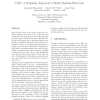Free Online Productivity Tools
i2Speak
i2Symbol
i2OCR
iTex2Img
iWeb2Print
iWeb2Shot
i2Type
iPdf2Split
iPdf2Merge
i2Bopomofo
i2Arabic
i2Style
i2Image
i2PDF
iLatex2Rtf
Sci2ools
126
click to vote
OSDI
2002
ACM
2002
ACM
CMC: A Pragmatic Approach to Model Checking Real Code
Many system errors do not emerge unless some intricate sequence of events occurs. In practice, this means that most systems have errors that only trigger after days or weeks of execution. Model checking [4] is an effective way to find such subtle errors. It takes a simplified description of the code and exhaustively tests it on all inputs, using techniques to explore vast state spaces efficiently. Unfortunately, while model checking systems code would be wonderful, it is almost never done in practice: building models is just too hard. It can take significantly more time to write a model than it did to write the rthermore, by checking an abstraction of the code rather than the code itself, it is easy to miss errors. The paper's first contribution is a new model checker, CMC, which checks C and C++ implementations , eliminating the need for a separate abstract description of the system behavior. This has two major advantages: it reduces the effort to use model checking, and it redu...
Related Content
| Added | 03 Dec 2009 |
| Updated | 03 Dec 2009 |
| Type | Conference |
| Year | 2002 |
| Where | OSDI |
| Authors | Madanlal Musuvathi, David Y. W. Park, Andy Chou, Dawson R. Engler, David L. Dill |
Comments (0)

